|
|
Places in Spain -
Galicia, Region of
Spain - see also Barbanza
| Galicia is unlike anywhere else in
Spain and is best described as
similar to Ireland or Cornwall. The
coastline comprises of tiny coves,
beautiful sandy beaches, flanked by
high cliffs and fishing ports and
sheltered harbours. Inland the
region is green and wooded,
especially along the valleys where
trees overlook lush meadows and
orchards. Known as the land of a
thousand rivers. Galicia is
separated from the rest of the
country by extensive mountain ranges
on all sides and only the river Miño
separates it from Portugal. Until
recently, the roads through the
mountains were less than adequate
and the journey from say, Vigo, to
Madrid would have taken up to 12
hours. With the opening of the A52
and A6 autopistas, this can now be
done in less than 5 hours. |
|
|
| Galicia
is now an increasingly popular
destination for those Spaniards who
don’t want the heat of the
Andalucian, Murcian or Valencian
summer but do want the scenic beauty
and culinary delights. Along the
coast, Galicia has a flourishing
economy which now includes its own
brand of tourism. The coastline is
popular with all manner of outdoor
activities that cannot be found
along any other coast. It is still a
place in which you can enjoy Spain
at its simplest and its best. |
| |
|
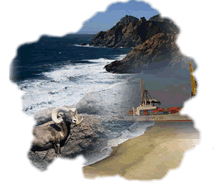
|
| |
|
Geography
Galicia is one
of Spain’s 17
Autonomous
Communities,
located in the
northwest
corner of
Spain, the
region of
Galicia is an
area
comprising of
grass and
granite that
has a rugged
coastline. It
comprises of
four
provinces,
LaCoruña,
Pontevedra,
Lugo
and
Ourense,
named after
their capital
cities. It is
Europe’s
western most
region. West
and north it
faces the sea.
East, it faces
the mountains
shared with
Asturias
and
Castile y Leon
and south, it
faces
Portugal. In
effect, it is
somewhat
hemmed in. Its
coastline is
perhaps the
most
spectacular in
the peninsula,
featuring many
fjords and
numerous
outstanding
beaches. For
the purists,
there are
1,200km of
winding
coastline, 750
beaches and
275km of fine,
white sand.
|
| |
| Low cost car hire in Galicia - Instant quotes, online booking and guaranteed reservations. Access to all the top car hire companies in Spain |
Brittany Ferries Holidays |
|
|
|
History
Galicia has
had its fair
share of
invasions –
the Celts
around 600BC,
the Romans
around 50AD,
the Visigoths
around 400AD,
the Normans
during the
Middle Ages
and the French
in 1808. The
region was
also visited
from time to
time by
Francis Drake
in the 16th
century.
Interestingly,
though, the
region was
largely
unaffected by
the occupation
of Spain by
the Moors from
the 8th
century
onwards. True,
the Arabs
ransacked
Santiago de
Compostela in
977 but they
didn’t hang
around much
after that,
perhaps
finding the
mountains and
the winter
rains too much
to bear. The
Celtic
influence is
most prominent
in Galicia and
it has been
described as
Ireland but
with sun.
Pictured right
is the
Galician coat
of arms. Click
the image for
a brief
description of
its origins.
|
|
|
Language
In
Galicia,
more than
80% of the
people
speak
Galician
well,
though
nearly all
of them
will also
speak
Castellano
(which is
what they
call
Spanish)
and may
even chose
to use it
most of
the time.
Galician
is known
as Galego
in the
local
language
and
Gallego in
Castellano.
Galego is
one of the
five
Iberian
languages
into which
Latin
transmuted
itself.
The other
four are
Spanish
(Castellano),
Catalan,
Asturian
and
Portuguese.
In
addition,
there is,
of course,
Basque,
which
bears no
relation
to any of
these or
to Latin.
It is said
that
Portuguese
developed
from
Galego,
the
original
language
having
spread
south
before it
was
standardised
in Lisbon.
Even now,
the people
of Galicia
and north
Portugal
can
understand
each other
reasonably
well. |
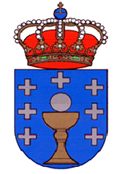 |
|
|
| Properties for sale in Galicia |
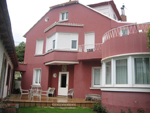 |
Seldom do you find a property for sale in an exclusive neighborhood in A Coruna´s town center next to Riazor beach.
Plot of 416m2 & House 327m2. Also private garage, office,laundry room and cellar
More info here |
| |
|
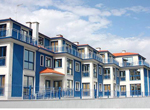 |
2 bedroom apartment in beautiful development in Aguiño
With storage room and own private parking space
PRICE (before): 106.500€
OFFER PRICE: 85.000€
More info here |
| |
|
 |
Detached house with excellent sea views
A quality home in Caion, A Coruna. Useful surface area of 260m2 and plot of 560m2. Beautiful fishing village, 25km away from city. Beach nearby and one of the richers gastronomic culture in the coast
More info here |
| |
|
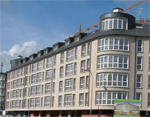 |
Das Alboradas Development situated in Cee, A Coruña
High quality home at cost price in a residential complex of 119 flats with children´s play area and paddle court.Own private parking space and storage room.
More info here |
| |
|
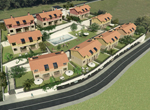 |
Holiday Apartments Development in Cabana de Bergantinos, A Coruna
18 duplex apartments currently in construction with seaviews and beaches close by.
The sale is negotiable by individual apartments (72m2) or as a whole.
For information contact: pedracuca2@gmail.com |
|
|
|
People and
Culture
Galicia
has a
population
of over 3
million
people,
widely
dispersed
throughout
the
region.
When Spain
itself was
still
reasonably
poor in
the 1960s,
Galicia
was even
poorer,
and now
that Spain
is on par
with the
rest of
Europe and
still
getting
better,
Galicia
still
seems
relatively
worse off.
Things
certainly
are
cheaper
here,
though
there are
naturally
pockets of
great
wealth and
it is not
too hard
to find
expensive
places.
Galicia is
a mythical
place and
has a
great
tradition
of myths
and
legends.
Galicians
like to
think of
themselves
as having
deep
Celtic
roots and
affinities
with
Ireland.
In fact,
one local
myth is
that
Galicia
was
‘colonised’
by
settlers
from
Ireland
and
Scotland
in the 3rd
century
BC. This,
of course,
would make
the
Galicians
very
different
from the
rest of
Spain. As
for
superstitions
- legends
of
werewolves
and
witches,
goblins
and
fairies
continue
to feature
in the
lives of
many. Most
visibly,
fortune
telling is
a
widespread
activity
in
Galicia.
Whether
Celtic or
not, the
Galicians
certainly
do uphold
one
Spanish
tradition
– they
throw
fiestas
whenever
they can.
During the
summer
months,
there is
bound to
one
somewhere
near
wherever
you are,
on
whatever
day. Many
of these
have a
gastronomic
theme.
Interesting
facts
• Housing
costs are
cheaper in
Galicia
than
almost
anywhere
else in
Spain.
• Crime
statistics
reported
in April
2003,
showed
Galicia as
being well
down the
list, at
number 17
out of 19
regions.
The worst
were
Spain’s
possessions
in
northern
Africa,
followed
by the
Balearic
Islands,
the east
coast and
then
Madrid.
• Galicia
is slowly
losing its
population,
especially
in the
interior.
Since
1986,
there has
been a net
loss of
about
10,000
people a
year. This
is despite
the
arrival of
‘immigrants’
and
returning
emigrants.
The main
reason is
that the
death rate
is higher
than the
birth
rate,
though
departure
from the
land
certainly
plays a
role. -
since
1986, the
rural
population
has
decreased
by 22% and
in the
last 6
years,
land under
cultivation
has
decreased
by 35%.
The
climate
Generally,
the
weather in
Galicia is
good to
very good
between
May and
September.
There will
be plenty
of sun and
temperatures
will be in
the 20’s
most days.
There may
well be
some rain
but this
will
rarely
last for
more than
a day or
two. This
is
particularly
true if
you take
your
holiday in
the lower
half of
Galicia,
especially
in the
Rias
Baixas.
Overall,
because of
Galicia's
location,
it has
both a
maritime
and an
Atlantic
climate.
Galicia
gets less
rain than
the UK
but,
because it
is
concentrated
in fewer
months, it
may
sometimes
seem like
more in
winter/spring.
Once you
move in
from the
coast the
land
quickly
starts to
become
mountainous.
The
weather
inland is
colder and
wetter
than it is
on the
coast.
There is
actually a
popular
ski resort
near
Ourense.
When the
north wind
blows in
the
winter,
night-time
temperatures
can fall
to zero
even on
the coast,
though
snow and
ice are
unknown
there. To
compensate
for this,
the days
are
gloriously
sunny.
Otherwise,
when the
wind is
from the
south-west
the winter
days are
cloudy or
wet and
the
daytime
temperatures
are around
15 degrees
and the
nights
average
around 9
or 10.
Living in
Galicia
There are
not many
foreigners
currently
living in
this part
of Spain,
although
the
numbers
are
beginning
to rise.
Unfortunately,
there are
none of
the
services
oriented
towards
foreign
residents
that can
be found
on other
popular
costas and
we found
that some
of the
English
residents
had an
attitude
problem;
most
likely
that they
fear an
invasion
of yet
more
Brits,
thus
affecting
the value
of their
homes and
the
quietness
they
currently
enjoy.
There is
nothing in
Galicia
like the
sort of
expatriate
communities
that exist
on the
southern
and
eastern
costas and
you will
struggle
to find an
estate
agent here
that
speaks
more than
a few
words in
English.
If you
intend on
buying a
home in
Galicia,
you will
probably
find
yourself
doing much
of the
work
yourself,
with
little or
no help.
The house
prices
being
lower than
the rest
of Spain
though may
be some
form of
compensation.
Prior to
the
introduction
of the
euro, in
line with
the rest
of Spain,
much of
the black
money
economy
found its
way into
the
property
business
and house
prices
rose
sharply.
They have
slowed a
little now
and are
beginning
to level
out. If
you are
contemplating
living in
Galicia,
be very
wary of
articles
in travel
magazines
or on TV
which
portray
Galicia as
an
undiscovered
paradise.
It is
certainly
a great
part of
the world
but it
naturally
has its
drawbacks
and you
need to be
aware of
these
before you
spend your
money.
Visiting
Galicia
Galicia
offers
some of
the finest
hotels
in Spain,
making it
a pleasant
place to
visit.
Galicia is
a region
of
contrasts
and as you
explore,
you will
find the
area
offers
very
different
backdrops.
Galicia’s
coast is
known as
the 'Costa
de la
Muerte' or
'Coast of
Death',
predominantly
because of
the number
of
shipwrecks
along the
rocky
coast. The
coast
offers
tiny
fishing
villages,
unspoilt
coves and
fine,
sandy
beaches.
Our
comments
on visits
to Galicia
We visited
Galicia in
July 2003
and found
it to be
the most
beautiful
part of
Spain that
we have
ever seen.
The most
welcoming
sight is
the
greenness
of the
valleys
and
plains.
Rivers run
wild and
fast and
offer
great
opportunities
for
canoeing
and
rafting.
The
architecture
in Galicia
is also a
unique
feature
and much
remains as
it was
centuries
ago. |
|
| |
 |
|
Learn Spanish Today for FREE! Learn
Spanish the interactive and fun way! Our web site will help
you learn Spanish free of charge. Not just a few Spanish
verbs, but over 500 words of the Spanish language, including
complete Spanish phrases and sentences. Watch our free online
demo that plays the first 15 minutes of a lesson. In this
demo, the in program manual is displayed on the screen. |
| |
|
|
 |
|
Insure your home in Spain at unbeatable prices with simple, easy to understand policies in your language |
| |
|
|
|
|
|
|
|

